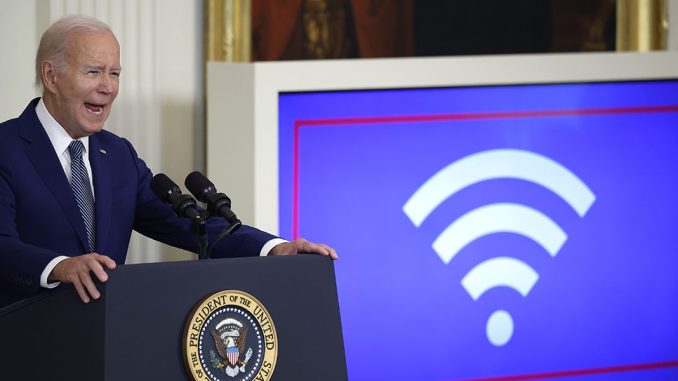
The Federal Communications Commission has adopted “woke” new rules to control internet services that will increase consumer costs, slow investment in new technologies, and raise the prospect of yet more government intrusion and censorship.
Commissioner Brendan Carr—one of two Republicans on the five-member FCC—called the plan “an unlawful power grab that gives the government a roving mandate to micromanage nearly every aspect of how the internet functions.”
Former FCC adviser Adam Candeub added: “The FCC is dishonestly claiming that it is promoting equity and fairness. However, the FCC is just seizing control over business decisions, funneling resources to politically preferred constituencies.”
The timing is particularly suspect, given entrepreneur Elon Musk’s effort to provide uncensored internet access via Starlink to go with the uncensored speech he already has delivered on his social media site X (formerly Twitter).
The FCC adopted the package of regulations Nov. 15. The new rules would empower the commission to prosecute internet service providers for alleged discrimination based on race, ethnicity, and other protected classes, as well as income.
The rules empower the FCC to “crack down on digital inequities,” as The Associated Press put it. By which the commission might mean, for example, punishing companies for building infrastructure in neighborhoods where the agency expects people actually will buy it.
The newly Democrat-dominated FCC allegedly imposed the new rules to “eliminate discrimination” in access to internet services. By which the commission means the uneven rollout of 5G service, itself stymied by regulatory red tape.
Congress, in the 2021 bipartisan infrastructure bill, delegated to the FCC the task to “ensure that all people of the United States benefit from equal access to broadband internet access.”
In fact, the agency found no evidence of intentional discrimination, but the leftists on the FCC used Congress’ delegation as an excuse to force equity and diversity mandates ranging from controls over discounts, language options, and credit checks to marketing and advertising.
What’s the goal? Essentially to reinstate so-called “net neutrality” rules that dictate how internet service providers treat traffic and use those rules to ram through a federal takeover of Americans’ access to the internet.
Beyond risking a dramatic expansion of federal control of the internet, the rules are likely to raise costs and slow service—the exact opposite of the stated intent. And the rules could radically expand government intrusion in the economy by characterizing a business that pursues more affluent customers as engaging in a form of discrimination.
As for costs, the rules will push companies to waste money building services that customers don’t want, to avoid charges of discrimination. This effectively would pass the costs on to actual paying customers, who would have to foot the bill for building potentially billions of dollars in broadband to nowhere.
The likely result will be higher costs for internet service for all customers, along with higher cable or streaming services—even phone bills—if the FCC uses these restrictions as a template for other services.
After all, companies already have plenty of incentive to build infrastructure where they think customers will pay for it. This rule is intended to make companies build even where customers won’t pay.
We know how that turns out from then-President Donald Trump’s repeal of similar “net neutrality” rules: The repeal actually lowered prices and raised speeds. This new rule puts all that at risk, piling more costs on families who already are suffering under inflation.
Indeed, given that companies themselves have limited capital budgets they now will have to spread over nonbuying customers, companies are likely to degrade service across the network. This will force not only higher costs but slower speeds.
The second effect is even more ominous: The risk of a radical increase in the federal government’s interference across the economy by expanding diversity mandates to include income and wealth.
This is because any product with a price automatically discriminates by income. The carmaker Ferrari, for example, disproportionately sells to rich people not because it doesn’t like poor people, but because poor people can’t afford its cars.
Are we to regard the very concept of price as implicit discrimination that requires a government solution? If so, we would need a Ministry of Prices and a Ministry of Incomes to ensure the proletariat are all equally chained.
As incompetent as the Biden administration has proven to be from inflation to the southern border to foreign policy, the one thing the president’s men and women put on their thinking caps for is capturing power.
The collateral damage, to both the economy and free speech, could be catastrophic.
Have an opinion about this article? To sound off, please email letters@DailySignal.com, and we’ll consider publishing your edited remarks in our regular “We Hear You” feature. Remember to include the URL or headline of the article plus your name and town and/or state.
Have an opinion about this article? To sound off, please email letters@DailySignal.com, and we’ll consider publishing your edited remarks in our regular “We Hear You” feature. Remember to include the URL or headline of the article plus your name and town and/or state.

